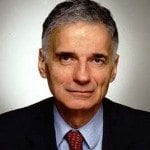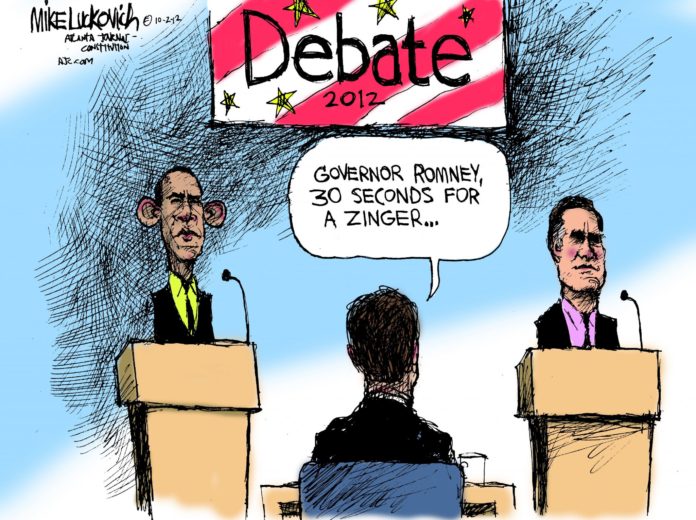BY RALPH NADER
 The three upcoming so-called presidential debates [actually parallel interviews] between Obama and Romney show the pathetic mainstream campaign press for what it is – a mass of dittoheads desperately awaiting gaffes or some visual irregularity by any of the candidates.
The three upcoming so-called presidential debates [actually parallel interviews] between Obama and Romney show the pathetic mainstream campaign press for what it is – a mass of dittoheads desperately awaiting gaffes or some visual irregularity by any of the candidates.
The press certainly does not demand elementary material from the candidates such as the secret debate contract negotiated by the Obama and Romney campaigns that controls the Commission on Presidential Debates [CPD], the campaigns’ corporate offspring.
A similar secret contract between George W. Bush and John Kerry in 2004, obtained by George Farah, executive director of Open Debates [www.opendebates.org] showed just how the two parties rig the debate process.
Both parties agreed that they would: [1] not request any additional debates, [2] not appear at any other debate or adversarial forum with any other presidential or vice presidential candidate, and [3] not accept any television or radio air time offers that involve a debate format.
Were this deal to be between two corporations, they could be prosecuted for criminal violation of the antitrust laws.
This year voters are not allowed to know about the current backroom fix between Obama and Romney.
Farah revealed more. The Bush/Kerry closeout of the voters and the media extended to their agreeing not to ask each other direct questions but only rhetorical questions, and to clear any questions from the audience by their chosen moderator prior to the debates. Of course third party candidates are excluded.
In 2000 and 2004, national polls showed majorities wanting me in the debates – the only way non-billionaires could reach tens of millions of voters – but the captive CPD and their compliant director, Janet Brown, created other exclusionary barriers.
Nothing seems to motivate the mainstream campaign press into challenging the two party duopoly, its definition of important questions, or the rancid corporate sponsorship of the debates down to the hospitality parties the corporatists hold at the debate locations in Colorado, New York and Florida this October. The reporters must like the free wine and food.
Nor did the supine press inform the voters of recent written requests by numerous organizations in the Pittsburgh, District of Columbia and Portland, Oregon regions inviting the presidential candidates to debate in these areas [http://nader.org/2012/09/18/ralph-nader-dc-organizations-call-for-presidential-debate/].
Heaven forbid that the people strive to shape the presidential debate process and weaken the duopoly’s grip. Imagine a democratic process.
Substantively, the supine press applies its own rules.
Rule One is to avoid pressing questions that extend the public’s agenda beyond what the two major candidates are wrangling over. So if they don’t debate pulling back from unauthorized wars, invasions, incursions or other important foreign policy moves they are not asked.
Rule Two is to ignore what major civic groups or groups with credible track records propose for the candidates to address. So Obama and Romney are not pressed by the press to expressly respond to many important issues including: what they would do on law enforcement against corporate crime, fraud and abuse, whether they favor a $10 minimum wage that catches up to 1968, inflation adjusted, for thirty million workers, or on their positions on either a Wall Street speculation tax that can raise big money or even a carbon tax.
Union organizing rights, workers’ health and safety, and a variety of important consumer protections are scarcely on the press table even when their own colleagues often report on these timely subjects.
When a matter is super-timely and they can interview the nation’s foremost expert on the politics of presidential debates – George Farah, author of No Debate – the major media is not interested. They have rejected his op-eds. Apart from local radio shows, he cannot get on national public radio, public TV or the commercial networks. It is not for lack of space and time being devoted to the presidential campaigns.
I know Farah. He worked for me over a decade ago, right out of Princeton before going to Harvard Law School. He is an interviewers’ dream – speaks crisply, cogently and convincingly.
Maybe reporters should be given “curiosity training sessions” about what the public needs and wants to know but that the candidates are not interested in discussing.
Maybe columnists should work with the people on the ground instead of just working off clips and dealing with political flaks who restrict access to the candidates. Some columnists could benefit from a sabbatical for self-renewal.
Maybe editors and producers should expand beyond the usual “talking heads” and give the many important outside voices and movements some deserved coverage.
Our country needs a better performance by the major media that is stuck in routines, ruts and stagnant self-censorship from the national to the local levels. This is especially true of the concentrated television industry that uses our public airwaves, free of charge.
Nader.org








